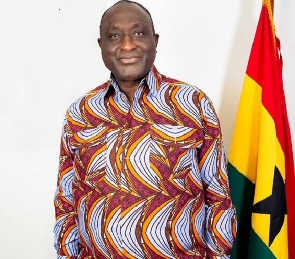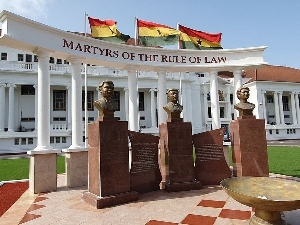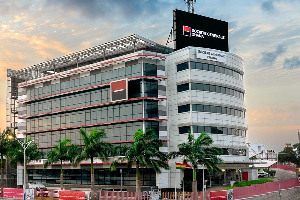Opinions of Wednesday, 18 January 2023
Columnist: William Fiifi Wilson
Alan K's GTP: Cocktail of plagiarized NPP manifesto, policies and admission of failure
I will confidently assert that Alan Kyerematen's Great Transformational Plan (GTP) is a typical political cliche. This is because it lacks originality and the prospects of great transformation, as he will have us think, given that some of the ideas he enumerates already exist. Aside from being a rehash of prior NPP manifestos or policies, contradictions, and deficiencies in the plan, it also examines the great responsibility and stewardship of Mr. Kyerematen as a Minister of Trade and Industry. The first section of my article will cover the preamble to his speech, and the second section will include his 10-point plan.
Mr. Kyerematen emphasised two key points in his opening remarks, which I will quote: “The President has laid a strong foundation for the socioeconomic development of our country, although I believe there are things that could have been done differently. My vision is to build a superstructure on this foundation that will bring prosperity to our nation” and “..I will become the transformational leader of our time, who will build on the foundations laid by successive leaders of our nation over the last sixty-five (65) years”.
The quote above is rather conflicting. Mr. Kyerematen sought to commend President Akufo Addo for laying a solid foundation for him to build a superstructure while also implying that the President could have done things differently. When did Mr. Kyerematen realise that the President could have done things differently and in which sectors of the economy? How can you build on a foundation that you believe could have been done differently? This inconsistency is so glaring! It is an opportunistic comment and an attempt by him to disassociate himself from a government in which he has served as a cabinet minister for six (6) years owing to the present economic downturn. It also reveals Mr. Kyerematen's leadership skills as a leader who always runs away from battles and refuses to shoulder responsibility.
One would think that for a man who describes himself as a transformational leader and one who will do things differently from successive governments, there would be some paradigms shift from the norm with some degree of creativity in his vision, and the capacity to do things differently that can truly offer this great transformation he appears to be touting.
For instance, according to Alan Kyerematen, we need a new plan to avoid going to the IMF. He also identifies the bane of our economy and the reason which have repeatedly compelled us to subscribe to the IMF programme. " This is the seventeenth time that we have gone to the IMF over the last 57 years. We promised never to go back but we have gone back. One of the lessons that we have learnt from the recent developments is that Ghana’s economy is still fragile, vulnerable, and susceptible to both external and domestic shocks. This is primarily because our economy is highly dependent on the export of commodities with little or no value addition," he argues.
It is interesting to note that the NPP’s Economic Policy Objectives as stated in its 2016 manifesto on page 13 read as follows, “ Our economic programme will enhance agricultural production and productivity, along with a transformation of the economy through value-addition to our raw materials in a process of rapid industrialization”
Also, on ensuring Macroeconomic stability, the 2016 NPP manifesto on page 16 amongst others states that “stabilize the currency exchange rate for the long term through prudent and disciplined macroeconomic management, an increase in domestic production, and an increase in exports” .
The Trade and Industry policy objective of the 2016 NPP manifesto on page 24 states that “promoting exports, especially of value-added agricultural products and light manufactures”.
It is critical to ask Mr. Kyerematen if his new plan to wean our economy off its perennial IMF subscription and maintain its stability and growth is as new as he professes. It's evident that what he seeks to describe as a ‘New Plan’ is not new by any shred of imagination. Indeed, it is a policy that had found expression in different portions of the NPP manifesto since 2016, as stated above. The only thing new is the fact that Alan Kyerematen has failed to own up to his responsibility by telling Ghanaians that adding value to our commodities for domestic consumption and export was part of his briefs as Minister of Trade and industry for six (6) years. Instead, he has shifted the blame to the President, who appointed him with full confidence to solve such a challenge for the nation on his behalf.
For example, in the 2020 NPP manifesto on industrialisation, it is stated that the government is to "produce at least half of Ghana’s sugar needs locally within the next four years". However, the Komeda Sugar Factory which was under the Ministry of Trade and Industry and the leadership of Mr. Kyerematen for six (6) years has failed to produce a teaspoon of sugar for local consumption or export.
It is interesting how Alan Kyerematen has demonstrated through his own words that the lack of effectiveness, creativity, and practicality of the Ministry of Trade and Industry, where he has served as a Minister for six consecutive years (6), is the reason for our economy's return to the IMF and the instability of our exchange rate, which is primarily due to the challenge in domestic production and export of manufactured goods through value addition to our commodities.
Again, the Great Transformational Plan (GTP) in its current form, as articulated by Mr. Kyerematen, suffers from a lack of coherence and credibility. On the one hand, he alluded to the fact that he would build his GTP on the solid foundation of his predecessors, while on the other, he will rely on the current Post-COVID Economic Recovery Programme (P-CERP) and IMF programme that is yet to take off as a transitional economic programme that will allow him to implement his GTP.
It begs the question, what is great or transformative about the plan if all it can do to be executed is rely on a recovery programme or an IMF programme? Or is he going to build on a system that he has defined as solid on one hand, and claimed to be underperforming which is why we have been to IMF 17 times on the other hand?
Also, if Alan Kyerematen, as Minister of Trade and Industry, was unable to ensure that we added value to our commodities for domestic consumption and export for a period of six (6) years with the full support of the President, the private sector, and statutory budgetary allocation, what magic can his GTP do for a period of five (5) years spanning 2025 – 2030 as he envisions?
Perhaps, Mr. Kyerematen was right when he claimed that we are a nation of NATO, "No Action Talk Only". During his six (6) years of stewardship at the Trade and Industry Ministry, he has not demonstrated otherwise.
Mr. Kyerematen emphasises the primacy of the private sector in our national development. Again, this is not a new phenomenon; it has always existed and served as the primary driver for all NPP governments. One recalls President Kufuor's vision of harnessing the private sector as the engine for growth. On page 13, the 2016 NPP manifesto states, "we will focus on growing the economy and creating wealth and prosperity for the vast majority of Ghanaians through private sector empowerment" about its economic objectives.
Mr. Kyerematen alleges that the bane of our country's progress is the arrogance of power. This is quite rich coming from Mr. Kyerematen. For the first time in our republic's history, a serving Cabinet Minister organised a national broadcast to not only announce his resignation, which was yet to take effect but also to criticise and distance himself from the President and his government. Indeed, Mr. Kyerematen who sounded so desperate for power, could not even wait to pass the mark to become an NPP flag bearer of the NPP before urging Ghanaians to vote for him as President of Ghana.
Mr. Kyerematen has once again through this singular act shown a high level of insubordination to the President and the leadership of the NPP. If this isn't the arrogance of power at play, what is it? It must be made clear to Mr. Kyerematen that servant leaders with humility do not exhibit such a trait, and therefore he does not fill the bill to be one.













